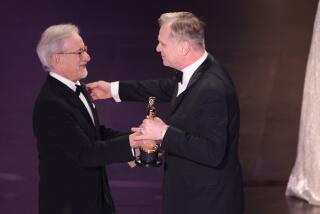For independent films, Oscar buzz often means change of fortune
Awards season is a boisterous clamor for attention, full of prestige picture releases and endless marketing dollars strewn to support them — all with the goal of taking home a few statues early next year. But amid the ado there are exceptions: The low-budget, slow-burn films that refuse to go away and end up on nomination lists. Think “Precious,” think “Winter’s Bone,” think “Beasts of the Southern Wild.” Filmmakers know those pictures run on charisma and not marketing dollars, but they also know that awards season is when they can shine. After all, in 2011 a $15-million film (“The Artist”) won best picture.
So they live in hope and play the lottery. Alexander Payne’s black-and-white “Nebraska” is one such potential contender this season, but he’s a pretty safe bet for a studio that wants an indie picture in awards season — a fact he acknowledges. “Oscar nominations mean money, and studios are looking at money,” says Payne. “The fact that my last four films had nominations, with two wins — they act like I’m a made guy.”
“Nebraska” was released last month in the heart of awards season, but few small pictures get that kind of plum position. His likely companions in the dark-horse race this year include “Frances Ha,” “Fruitvale Station” and “Enough Said,” all of which have been moving the needle in terms of early awards talk, and none of which were released later than early October. They’re all intimate, character-driven dramas — what once were happily touted as independent films — and being included in the conversation means different things to different directors.
“My goal personally in making this film is to raise awareness about the particular situation,” says “Fruitvale” director Ryan Coogler. “You talk about a film we shot a year ago on a budget that was less than $1 million, and people are still talking about it — we’re fortunate in that regard.”
“Frances Ha” is benefiting from some good luck and timing, thanks to a DVD release by Criterion in November; “Ha” originally came out in June and could have faded away, but this will change its fortunes.
“That means there will be another round of conversations about it,” says “Frances” star and screenwriter Greta Gerwig. “It’s a beautiful DVD, with additional materials, and then it’s coming out on iTunes, so it’ll be easier for people to see it. You could send a screener out to everyone in the guild, but because it’s coming out on these platforms, we can just send out screeners that we need to and let other people see it in other ways.”
TIMELINE: The Academy Awards through the years
Buzz can make or break a film’s future in awards season but veterans know not to rely too heavily on the fact that their films are part of the bigger picture. Nicole Holofcener, director of October’s “Enough Said,” says she’s gone through this process before with her films, and tries not to focus on prizes and awards.
“I’ve been told by other studios that have released my movies that they’re not going to release something in awards season because it’s not ‘tracking’ that way, even if the reviews were incredible,” she says. “If people don’t say, ‘This could win an Oscar,’ they don’t spend the money. In one sense, I don’t blame them — but I don’t have [ads on] bus stops and billboards, so it’s great to have the movie mentioned in a positive way.”
In the end, more than for bigger-budgeted pictures, the old cliché is true: It’s an honor just to be recognized. A dark horse filmmaker who takes his picture or her actors up to the pinnacle of awards season will likely see some kind of less quantifiable reward than a golden statuette. Notes Gerwig, “Frances” director Noah Baumbach’s “The Squid and the Whale” led to Golden Globe nominations for stars Jeff Daniels and Laura Linney, which helped cement him as a filmmaker who gets actors nominations.
VIDEO: Highlights from the Envelope Screening Series
“That makes actors very excited to work with you,” says Gerwig. “It helps in enticing other actors aboard for other projects. You can know a director is great without awards — but it doesn’t hurt.”
Still, Holofcener doesn’t necessarily see the benefit of awards or nominations, at least not as an independent filmmaker. “If an actress wins an Oscar, her salary goes up enormously,” she says. “That might be the same for me if I took a job for a $40-million movie. But if my next movie is small and not that commercial, my salary is commensurate with the budget — no matter what prize I won.”
But for Gerwig, the whole process is inspiring and makes her want to continue making these low-budget wunderkind long shot projects. “It seems like insanity to put so much life and heart and sweat into another 90-minute piece of flickering light,” she says. “But at the end of the year if it’s in that conversation with people I respect, even if it doesn’t win, that’s OK. It didn’t fall on deaf ears — there’s an audience, people care, people remember. And that is kindling for the spirit.”
MORE OSCAR COVERAGE
WINNING BALLOT: A list of the 2013 winners
TIMELINE: Academy Awards through the years
More to Read
From the Oscars to the Emmys.
Get the Envelope newsletter for exclusive awards season coverage, behind-the-scenes stories from the Envelope podcast and columnist Glenn Whipp’s must-read analysis.
You may occasionally receive promotional content from the Los Angeles Times.








